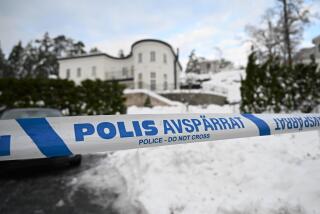Russia Tries Journalist for Treason
- Share via
MOSCOW — An outspoken naval journalist who exposed the Russian navy’s dumping of nuclear waste in the Pacific was put on trial for treason Thursday in what his backers charge is a politically motivated attempt to silence him.
The Russian government, increasingly using secrecy laws to protect the military from embarrassing revelations, has charged navy Capt. Grigory Pasko with selling classified defense information to an undisclosed foreign country.
Pasko’s trial parallels the case of former navy Capt. Alexander Nikitin, who was tried on espionage charges in St. Petersburg last fall after he helped a Norwegian environmental group prepare a report exposing radioactive pollution by the Russian navy above the Arctic Circle.
Russia’s Supreme Court is scheduled to hear appeals in Nikitin’s case next month.
The Pasko case hinges on his videotaping of and reporting on the Pacific Fleet’s disposal of radioactive waste in the Sea of Japan.
As a correspondent for the military newspaper Boyevaya Vakhta, or Combat Watch, in Vladivostok, Pasko, 37, provided reports on the dumping to a Japanese newspaper and television station, but his supporters say he never divulged any secret material.
“We are dealing here with a classic case of political persecution,” said Alexei K. Simonov, president of the Glasnost Protection Fund, a journalists rights group that has rallied to Pasko’s defense. “We firmly believe that an attempt to conceal the ugly deeds of the Russian military from the world community is a political crime.”
Pasko, who could face up to 20 years in prison if he is convicted, has been in jail for 14 months. The military rejected a defense motion to open the trial to the public but agreed to permit two observers from journalists and veterans organizations.
Environmental, human rights and journalists groups in Russia and abroad are disturbed by what they see as a growing trend in Russia to use secrecy laws to muzzle environmental critics. Even the charges against Pasko and Nikitin have been classified.
Amnesty International has declared both men to be “prisoners of conscience” and urged the government to drop the charges.
Pasko has also won the support of the New York-based Committee to Protect Journalists, which appealed to Russian President Boris N. Yeltsin to set him free.
“We believe a guilty verdict against Pasko would have a chilling effect on investigative journalism in Russia and set a dangerous precedent for future use of the country’s law on state secrets by officials against journalists,” Ann K. Cooper, the organization’s executive director, wrote in a letter to Yeltsin.
The first day of Pasko’s trial was taken up with procedural matters and the reading of the first part of the 67-page indictment, his attorneys said.
The lawyers said they are not optimistic about winning before the panel of naval judges, but they plan to appeal to the Supreme Court and, if necessary, the European Court.
“The legend that the prosecution has concocted simply does not hold together,” said Anatoly F. Pyshkin, one of Pasko’s attorneys. “It is absolutely obvious to me that there is not enough evidence to sentence Grigory, and whatever evidence exists will topple like a house of cards when we start to question the witnesses.”
The Federal Security Service, the main successor to the Soviet-era KGB, will not discuss the charges against Pasko.
Before his arrest, Pasko was also looking into the whereabouts of millions of yen that Japan had donated for the cleanup of radioactive waste in the Russian Far East.
“Grigory was the only person who was writing on the subject of disposal of radioactive waste in the ocean on a regular, professional basis,” said his wife, Galina Morozova, from their home in Vladivostok. “He published more than 50 articles on the subject. When he tackled the subject, it was a major blow to the military. And they felt it their vital duty to gag Grigory and stop the leakage of information.”
Pasko’s greatest expose came in 1993 when he videotaped sailors dumping radioactive waste into the Sea of Japan.
When his footage was aired on Japanese television, it sparked international outrage.
After Pasko’s arrest, police searched his apartment and seized documents, a computer and videotapes but missed one tape that was kept with children’s videos. Released by his supporters this week, it showed sailors on a barge throwing mortar shells and other old munitions into the sea.
In an effort to keep Pasko’s case in the public eye, his supporters entered him as a candidate for the Vladivostok City Council. He narrowly lost in balloting Sunday.
More to Read
Sign up for Essential California
The most important California stories and recommendations in your inbox every morning.
You may occasionally receive promotional content from the Los Angeles Times.













